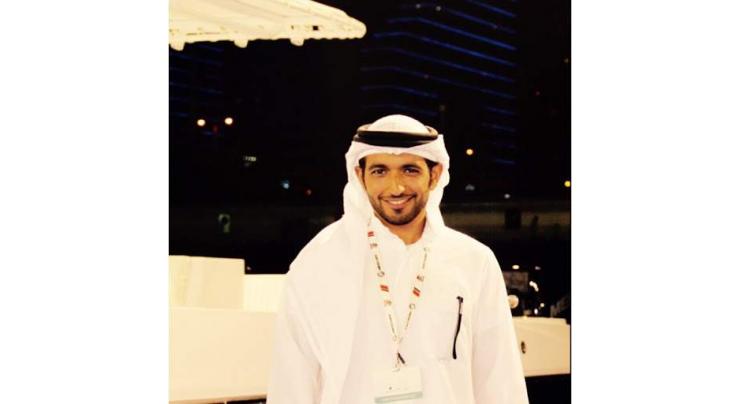
ITU Elects Emiratis To Important Posts
Umer Jamshaid Published November 19, 2018 | 05:00 PM

Reinforcing the UAE’s leading position in information communications technology, ICT, Saif Bin Ghalaita, Executive Director of Technology Development Affairs Department,
DUBAI, (UrduPoint / Pakistan Point News / WAM - 19th Nov, 2018) Reinforcing the UAE’s leading position in information communications technology, ICT, Saif Bin Ghalaita, Executive Director of Technology Development Affairs Department, Telecommunications Regulatory Authority, TRA, was elected as Vice Chairman of the International Telecommunications Union, ITU, Council and Abdul Aziz Al Zarooni, Information Security Engineer at the TRA, was named Chairman of the Working Group on the Child Online Protection initiative of the ITU.
Tariq Al Awadhi, Executive Director of Spectrum Management at the TRA, chaired the Arab Group during the conference. The selection was announced on the concluding day of the ITU’s Plenipotentiary Conference, PP-18, which was held at the Dubai World Trade Centre.
The achievement reflects the on-going efforts of the UAE in the ICT sector and acknowledges the outstanding potentials of the UAE citizens, who have, time and again, proved their competence in scientific, economic and cultural fields.
Commenting on his selection, Bin Ghalaita said, "I am proud to be representing my country in this important position and I will work hard to implement the policies and promote initiatives that serve the Sustainable Development Goals, SGDs, and help in the implementation of our national policies. Also, I will spare no effort to achieve the vision of the ITU in ICT, which is the driving force behind the prosperity and development of people, worldwide."
He added, "The ITU Council is the governing body and its role is to consider broad telecommunication policy issues and ensure that the union's activities, policies and strategies are equipped to handle today's dynamic and rapidly changing telecommunications environment."
Bin Ghalaita stressed that the UAE’s future-ready leaders have always proved that they are capable of leading global positions. He added, "We are the children of Zayed, we have learnt from and have grown up in the presence of great leaders. They have wanted us to emerge as examples in success and leadership.
"
Al Awadhi chaired the Arab Group, one of the member groups out of a total of five that proposed their technological contributions and accessed the state of ICT in their countries. "The Arab Group offered technical contributions and presented its role in enhancing the ICT sector in the Arab region. The UAE is positioned at the forefront to lead the smart transformation, connecting the world and building the right infrastructure, hence we are happy to lead the Arab Group."
Al Zarooni said, "It is a great honour for me to lead a team that protects the younger generation from the perils of cybercrime, which is one of the more serious threats faced by children today. As part of this team, our workload is overwhelming, especially at a time when most countries of the world are adopting smart education policies that facilitate easy internet access to children and hence making them more vulnerable to cybercrime."
"We will work collaboratively with other sectors to create a safe digital community for children while enabling them to surf the internet. We will do this by adopting a comprehensive approach towards promoting child safety on the internet and by developing strategies that cover five key areas, including legal, technical and procedural measures, organisational structure, capacity-building and international cooperation," he explained.
The Child Online Protection initiative, which aims to create a safe and empowering digital community for children around the world, also helps member states implement these initiatives. The initiative came into being during the wake of multiple child frauds on the internet, fuelled by the proliferation of smart devices and unlimited access to the internet.
The conference, which was held in Dubai from 29th October to 16th November 2018, closed with the signing of the Final Acts. The conference attracted more than 2,300 participants from 180 countries this year, up from 171 countries in 2014.
Related Topics
Recent Stories

Israel carries out attack inside Iran, report US media

Saudi Assistant Minister of Defence calls on army chief

Currency Rate In Pakistan - Dollar, Euro, Pound, Riyal Rates On 19 April 2024

Today Gold Rate in Pakistan 19 April 2024

Rock-solid Ruud racks up season-leading win in Barcelona

At UN, Iran says it will make Israel 'regret' reprisals

G7 hears calls for 'critical' Ukraine aid

EU seeks to leverage might to confront China, US challenge

5 Customs officials martyred as their vehicle ambushed by terrorists in D I Khan

Pak-New Zealand match called off due to rain

NHA restores traffic on roads affected by recent rains in Balochistan

China to fully support Pakistan's efforts against terrorism: Ambassador Jiang
More Stories From Middle East
-

UAE announces ‘Zero Bureaucracy Program’ to reduce bureaucracy
3 months ago -

COP28 President-Designate welcomes Transitional Committee agreement to operationalise Loss and Damag ..
6 months ago -

Global Media Congress 2023 to feature Co-Production Majlis as a new networking platform
6 months ago -

Young female athletes shine at Abu Dhabi World Youth Jiu-Jitsu Championship
6 months ago -

King of Jordan receives Abdullah bin Zayed and ministers participating in Arab coordination meeting
6 months ago -

Abdullah bin Zayed participates in coordination meeting of Arab foreign ministers, joint meeting wit ..
6 months ago
-

3rd annual conference of Emirates Society of Clinical Microbiology kicks off in Dubai
6 months ago -

SIBF 2023 hosts Nobel laureate to discuss emergence of ‘Afrofuturism’ in global discourse
6 months ago -

ALC announces winners of Kanz Al Jeel Award 2023
6 months ago -

SIBF turns spotlight on remarkable contributions of women
6 months ago -

Global assets in spot bitcoin ETFs hit $4.16 billion
6 months ago -

Rescuers struggle to find Nepal quake survivors as deaths reach 157
6 months ago











